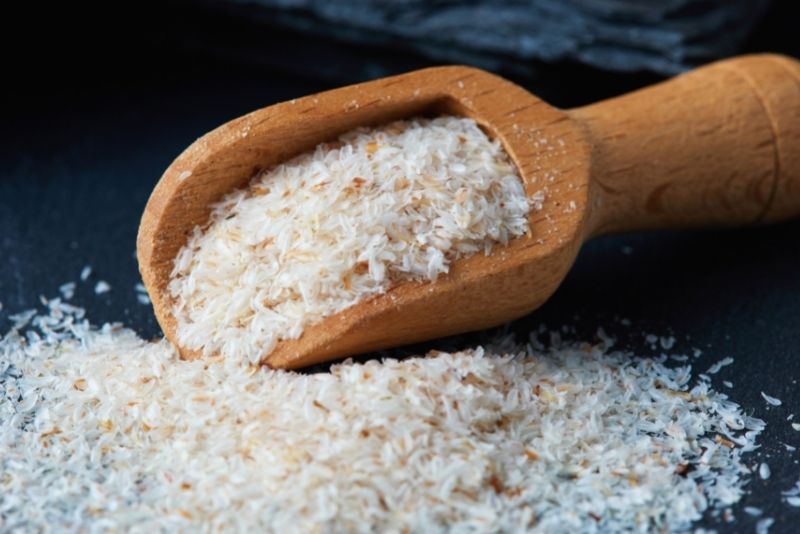Have you ever heard of Psyllium husk? If not, you’re not alone. Psyllium husk is a type of fiber that’s derived from the Plantago ovata plant. It is a soluble fiber, which means it absorbs water and forms a gel-like substance.
It’s most commonly known for its use as a laxative. The gel-like substance formed by psyllium husk can help to bulk up stools and make them easier to pass. This is why psyllium husk is often used as a natural treatment for constipation and other digestive issues.
Additionally, psyllium husk can be used as a thickener or binder in recipes. It is available in powder form or as whole seeds. It can be added to water or juice or sprinkled on top of food.
But if you can’t find it or don’t like the taste, here are some of the best psyllium husk substitutes that can do the job just as well.
Table of Contents
10 Best Psyllium Husk Substitutes
1. Chia Seeds
Chia seeds are small black seeds that come from the Salvia hispanica plant. They’re a good source of fiber, with about 10 grams in a 28-gram (1-ounce) serving.
They’re also rich in omega-3 fatty acids, antioxidants, and other nutrients. Like psyllium husk, chia seeds can absorb water and form a gel-like substance.
This makes them a great thickener for soups, sauces, and puddings. Chia seeds can also be used in place of psyllium husk to make vegan egg replacers. Simply combine chia seeds with water and let the mixture sit for a few minutes to thicken.
2. Flaxseed
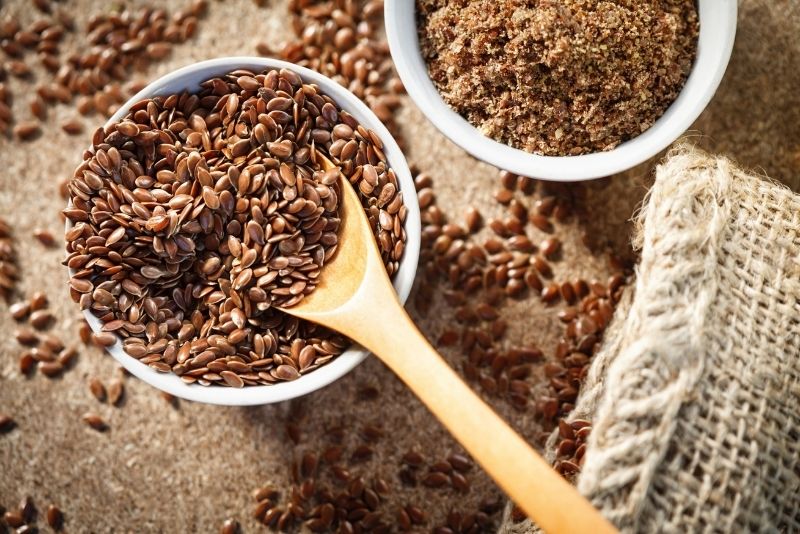
Flaxseeds are small, brown seeds that come from the flax plant. They’re a good source of fiber, with about 3 grams in a tablespoon.
Flaxseeds can be eaten whole or ground into a powder. When ground, they can be used as a psyllium husk substitute.
The gel-like substance formed by flaxseeds can help to thicken and bind ingredients together, making them ideal for use in baking. Flaxseed meal can be used in place of psyllium husk at a 1:1 ratio.
3. Xanthan Gum
Xanthan gum is a type of dietary fiber that’s often used as a food additive. It’s produced by adding bacteria to corn sugar or other carbohydrates.
The resulting mixture is then dried and ground into a powder. Xanthan gum can be used to thicken, emulsify, and stabilize foods.
It’s often used in place of psyllium husk as a vegan egg replacer. You can also use it to make gluten-free flour blends. Xanthan gum can be added at a ratio of 1/2 teaspoon per cup of flour.
4. Cornstarch
There is an easy substitute for psyllium husk that can be found in most kitchens: cornstarch.
Cornstarch is a type of starch that’s derived from corn. When used in place of psyllium husk, cornstarch provides the same binding power and light texture.
It’s commonly used as a thickening agent in sauces, gravies, and puddings. When used in baking recipes, cornstarch helps to create a similar light and fluffy texture as psyllium husk.
Additionally, it is a fraction of the cost of psyllium husk, making it a great option for budget-minded bakers.
5. Coconut Flour
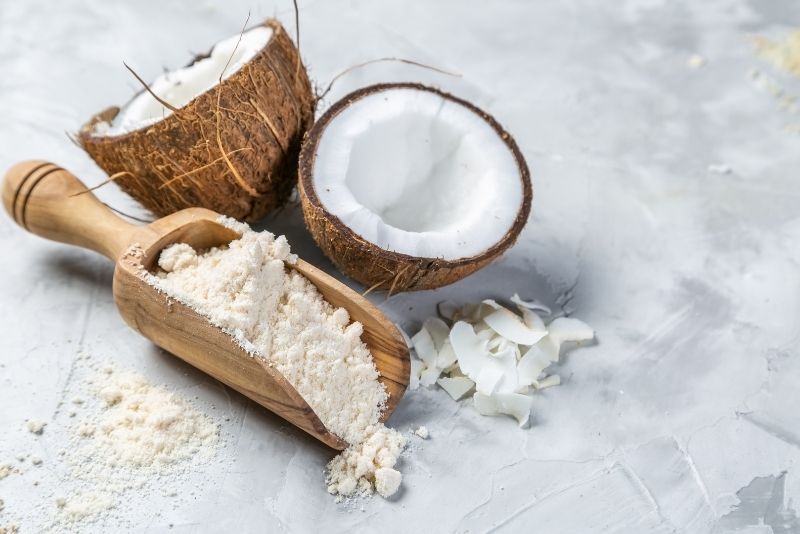
Coconut flour is made from finely ground coconut meat and has a similar texture to psyllium husk. It’s a good source of fiber and provides a Natural sweetness that can be beneficial for those following a low-carb diet.
Coconut flour can be used to make everything from pancakes to bread to cookies. In addition, coconut flour imparts a slight coconut flavor to baked goods, which can be a delicious addition to many recipes.
It is important to note, however, that coconut flour is very absorbent. As a result, recipes often call for more eggs and liquid when using coconut flour in place of psyllium husk.
6. Almond Flour
One possible psyllium husk substitute is almond flour. Almond flour is a fine powder made from whole, blanched almonds. It is moist and has a slightly sweet flavor.
Because it is made from almonds, it contains all of the nutrients that are found in almonds, including fiber, protein, and healthy fats.
Additionally, almond flour can be used in many of the same ways as psyllium husk, such as being used as a thickener or binder. It also helps to create a moist and fluffy texture in baked goods.
Another thing to keep in mind when using almond flour is that it has a somewhat nutty flavor, so it may impact the taste of your dish. Nevertheless, almond flour is a healthy and delicious alternative to psyllium husk.
7. Tapioca Powder
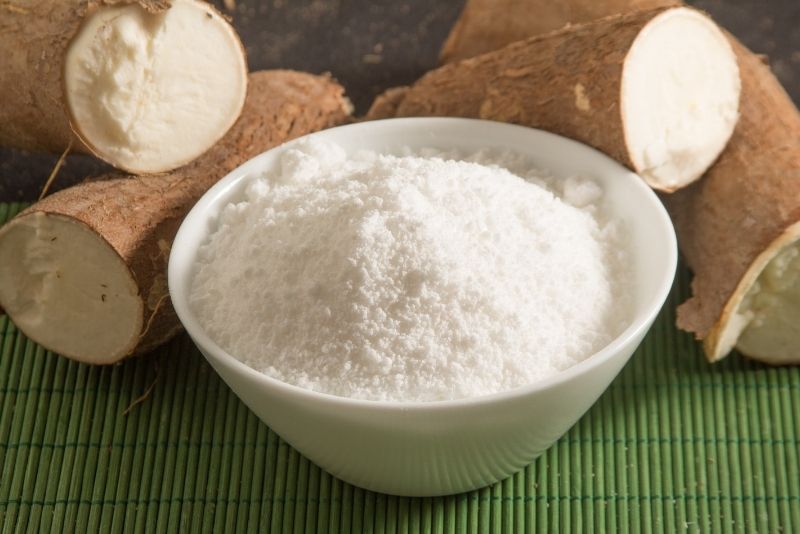
If you’re in a pinch, tapioca powder is an excellent substitute for psyllium husk powder. Tapioca powder is a type of starch that’s derived from the cassava plant.
It is commonly used as a thickening agent in soups and stews, or as a binding agent in pies and other baked goods. When mixed with water, it forms a gel-like substance that can be used to thicken soups, sauces, and puddings. Tapioca powder can also be used to make tapioca pearls, which are often found in bubble tea.
Tapioca powder is high in carbs and calories, but it is also gluten-free and an excellent source of dietary fiber.
8. Arrowroot Powder
Arrowroot powder is a white, powdery starch that’s extracted from the root of the Maranta arundinacea plant. It’s commonly used as a thickener in sauces, soups, and stews, or as a binding agent in recipes for bread, pancakes, and cookies.
It is also gluten-free and vegan, making it a popular choice for those with food allergies or dietary restrictions. Arrowroot powder has a neutral taste, which makes it ideal for use in sweet and savory dishes alike.
Arrowroot powder has a similar consistency to psyllium husk powder and can be used as a 1:1 replacement in most recipes.
9. Potato starch
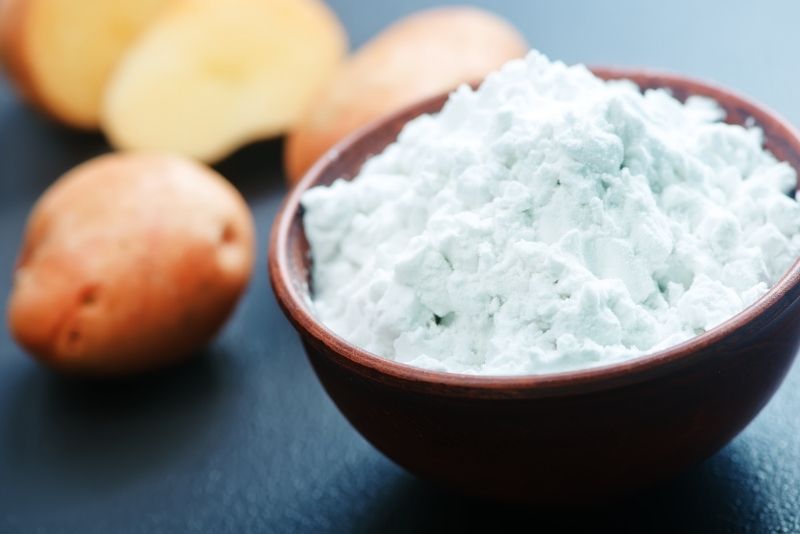
Potato starch is a type of dietary fiber that is widely used as a psyllium husk substitute. It is a white powdery substance that is derived from the starchy part of potatoes and is similar in appearance to cornstarch.
It is used in various food applications, such as thickening sauces, binding ingredients together, and providing a crispy coating for fried foods. Potato starch is used in a variety of food products, such as breads, pastries, and noodles.
Potato starch can be produced from either white potatoes or sweet potatoes. Sweet potato starch has a higher concentration of sugars, which gives it a sweeter taste. White potato starch has a higher concentration of starch, which gives it a more bland taste.
Potato starch is high in calories and carbohydrates, but it is low in protein and fat. Like psyllium husk, potato starch is high in fiber and helps to add bulk to stool. Additionally, it’s thought to promote regularity and may be helpful in treating constipation.
10. Rice Flour
Another substitute for psyllium husk powder is rice flour. Rice flour is a type of flour that’s made from finely ground rice. It has a mild, nutty flavor and can be used in both sweet and savory dishes.
It’s commonly used in Asian cuisine and can be used to make noodles, breads, pastries, and other baked goods.
Rice flour is used in gluten-free baking and as a thickener in soups and sauces. It can also be used as a coating for frying.
Rice flour is high in carbs and calories but is a good source of dietary fiber. Additionally, it’s gluten-free and can be used as a 1:1 replacement for psyllium husk powder in most recipes.
Related Questions:
What Does Psyllium Husk Taste Like?
Psyllium husk powder is a white, powdery substance that has a mild, Slightly sweet taste. When used as a thickener or binding agent, it does not impact the flavor of dishes. However, when used in large quantities, psyllium husk powder can give recipes a slightly gummy texture.
What Is the Difference Between Psyllium Husk and Psyllium Powder?
Psyllium husk and psyllium powder are made from the same plant, but they have different textures and uses. Psyllium husk is a coarse, fibrous substance that is used as a laxative or dietary supplement. Psyllium powder is a fine, powdery substance that is made from psyllium husk and is used as a thickener, binder, or binding agent.
What Does Psyllium Husk Powder Do in Baking?
Psyllium husk powder is commonly used in baking as a thickener, binder, or binding agent. When mixed with water, it forms a gel-like substance that helps to bind ingredients together. It also helps to add bulk and structure to baked goods. Additionally, psyllium husk powder helps to keep baked goods moist and soft.
Final Words
If you’re looking for a psyllium husk substitute, there are plenty of options to choose from. Each has its own unique flavor profile and texture, so it’s worth experimenting with different substitutes until you find one that works best for you.
Do you have any other questions about psyllium husk substitutes? Let us know in the comments below!
